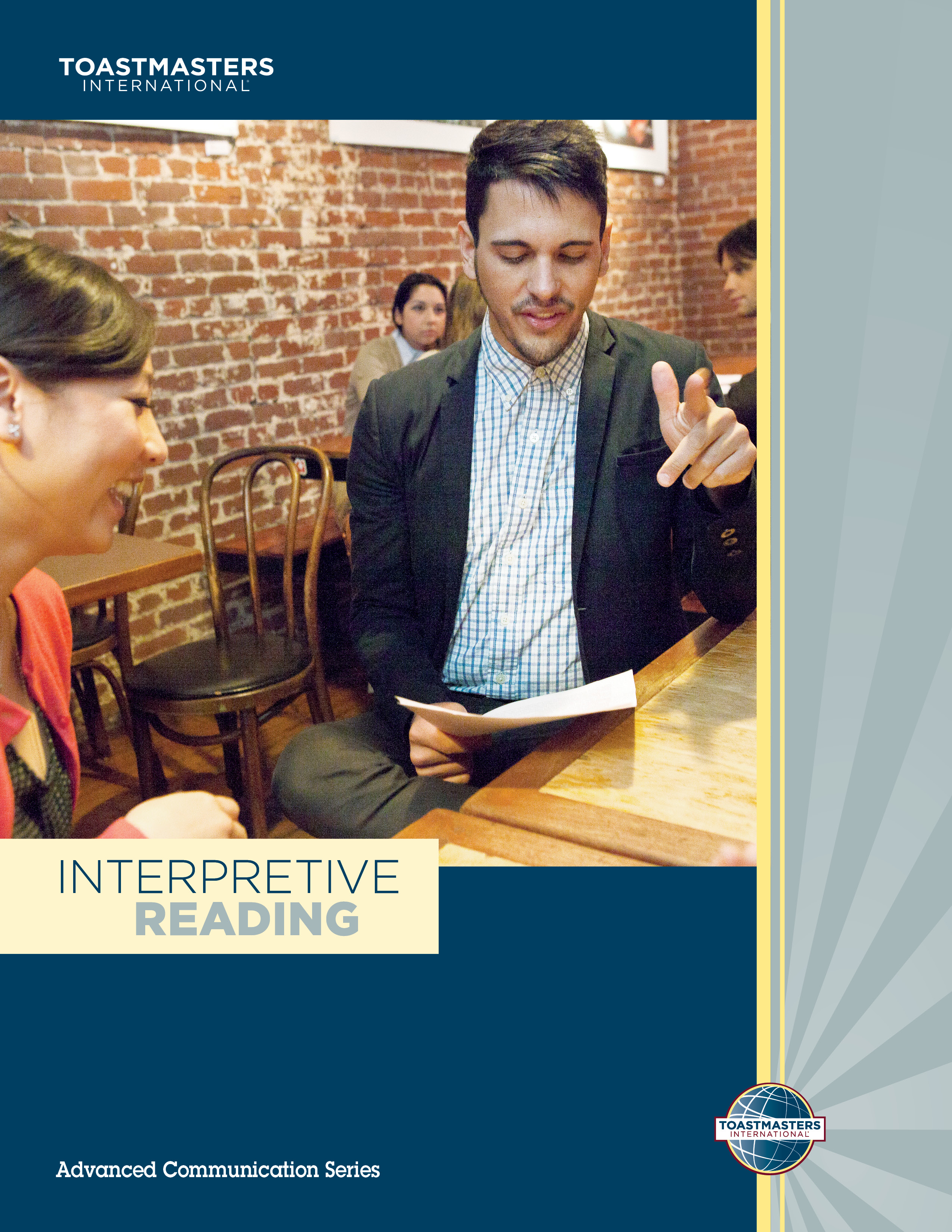Project #1: Read A Story
Executive Summary:
Your successful interpretation of an author's story depends on your understanding of it's overall meaning. Identify the story's general purpose, then break it down into parts and determine the meaning and purpose of each part. Then focus on communicating the story through your reading voice. Use vocal variety, tempo, rhythm, inflection and pauses to convey the story's emotion and actions.
Objectives:
- To understand the elements of interpretive reading.
- To learn how to analyze a narrative and plan for effective interpretation.
- To learn and apply vocal techniques that will aid in the effectiveness of the reading.
- TIME : 8 to 10 minutes
The purpose of this project was for the speaker to present a narrative using vocal techniques that help the audience to understand and enjoy the selection. The speaker was to convey the author’s meaning and emotions. It is suggested that you read the entire project and the appendix before the presentation.
Project #2: Interpreting Poetry
Executive Summary:
Poetry can be difficult to interpret because a poet often relies on symbolism, imagery and suggestion to convey its message instead of clear description. Identify the poem's general purpose, then break down the poem into stanzas or sentences and determine the thoughts expressed in each. Poetry makes greater use of rhythm, meter, cadence and rhyme than prose, so be careful to avoid delivering it in a sing-song manner.
Objectives:
- To understand the differences between poetry and prose.
- To recognize how poets use imagery, rhythm, meter, cadence and rhyme to convey the meanings and emotions of their poetry.
- To apply vocal techniques that will aid in the effectiveness of the reading.
- TIME : 6 to 8 minutes
In this project, the speaker’s task was to present a poem, using vocal techniques to capture the imagery and rhythm of a poem and to convey its meaning and emotions to the audience. It is suggested that you read the entire project and the appendix before the presentation.
Project #3: The Monodrama
Executive Summary:
In a monodrama, the speaker portrays a single character, striving to bring that character to live through voice, gestures and mannerisms. Usually the speaker appears to be talking to an unseen person who seems to motivate the speaker's words and actions, but it some situations the speaker may be talking only to himself. Analyze your selection for meaning and emotions, study the character's personality and relationship with others, then determine which vocal elements and body movement would best reflect the characters to your audience.
Objectives:
- To understand the concept and nature of the monodrama.
- To assume the identity of a character and to portray the physical and emotional aspects of this character to an audience.
- TIME : 5 to 7 minutes
In this project, the speaker was to present a monodrama, assuming a character who reveals his innermost thoughts and feelings on some matter of importance. All attention is focused on the speaker, and the speaker may seem to be talking to a second, unseen person whose unheard questions and statements seem to motivate the speaker’s words and actions. The speaker was to use voice and body to convey mental, emotional, and physical characteristics of the person who is speaking. It is suggested you read the project and the appendix before the presentation.
Project #4: The Play
Executive Summary:
The interpretive reader of a play reads the parts of more than one character, using different vocal qualities and body movement to distinguish between them. Select a play or portion of a play that involves only a few characters or you may confuse the audience. Practice the reading until you can smoothly change characters.
Objectives:
- To adapt a play for interpretive reading.
- To portray several characters in one reading, identifying them to the audience through voice changes and movement.
- TIME : 12 to 15 minutes
The speaker was to present a play, or portion of a play, using voice and gestures/body movement to suggest the different characters. It is suggested that you read the project and the appendix before the presentation.
Project #5: The Oratorical Speech
Executive Summary:
Presenting a speech given by someone else can be challenging. In this project, you must use all your interpretive reading skills to bring to life someone else's speech. This most likely will involve establishing a relationship with the audience, convincing them that your viewpoint is the best one. You must move them with your passion and sincerity.
Objectives:
- To understand the structure of an effective speech.
- To interpret and present a famous speech.
- TIME : 8 to 10 minutes
For this project, the speaker was to present a famous speech, using voice and gestures/ body movements to express the original speaker’s meaning and emotions. It is suggested you read the project and the appendix before the presentation.
For more information:
Item 226L

No comments:
Post a Comment